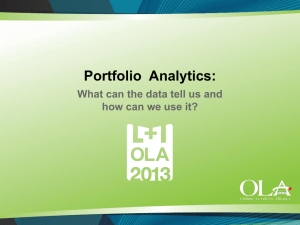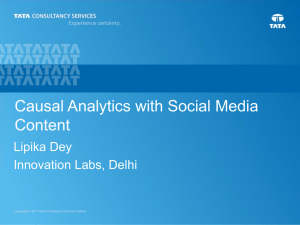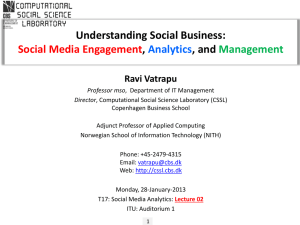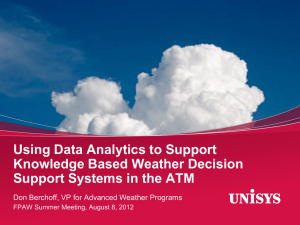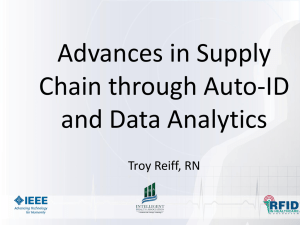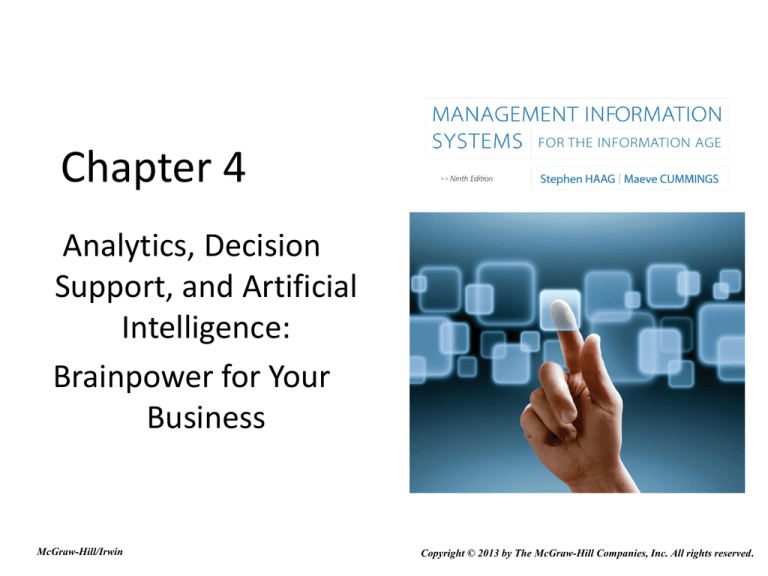
Chapter 4
Analytics, Decision
Support, and Artificial
Intelligence:
Brainpower for Your
Business
McGraw-Hill/Irwin
Copyright © 2013 by The McGraw-Hill Companies, Inc. All rights reserved.
STUDENT LEARNING OUTCOMES
1. Compare and contrast decision support
systems and geographic information
systems.
2. Describe the decision support role of
specialized analytics (predictive and
text analytics).
3. Describe the role and function of an
expert system in analytics.
STUDENT LEARNING OUTCOMES
4. Explain why neural networks are
effective decision support tools.
5. Define genetic algorithms and the types
of problems they help solve.
6. Describe data-mining agents and multiagent systems.
ONLINE LEARNING
Notice the increase in online learning and the
decrease in traditional enrollments.
Questions
1. Have you taken or are taking an online
course? Fully online or hybrid?
2. Why do students opt to take online courses
over traditional classroom courses?
3. Is this transformation occurring at the K-12
level?
INTRODUCTION
•
•
•
•
Businesses make decisions everyday
Some big and some small
IT tools can aid in the decision-making process
Use of IT Analytics is now key to the success of
any business
DECISIONS AND DECISION SUPPORT
Find or recognize the problem, need,
or opportunity
Consider ways of solving the
problem
Examine the merits of each solution
and choose the best one
Carry out the chosen solution and
monitor the results
Types of Decisions You Face
• Structured decision – processing a certain
information in a specified way so you always get
the right answer
• Nonstructured decision – may be several “right”
answers, without a sure way to get the right
answer
• Recurring decision – happens repeatedly
• Nonrecurring (ad hoc) decision – one you make
infrequently
Types of Decisions You Face
EASIEST
MOST
DIFFICULT
Decision Support Systems
• Decision support system (DSS)
• Highly flexible and interactive system
• Designed to support decision making when
the problem is not structured
• Decision support systems help you analyze,
but you must know how to solve the problem,
and how to use the results of the analysis
Components of a DSS
• Model management component – consists of
both the DSS models and the model
management system
• Data management component – stores and
maintains the information that you want your
DSS to use
• User interface management component –
allows you to communicate with the DSS
Components of a DSS
GEOGRAPHIC INFORMATION SYSTEMS
• Geographic information system (GIS) – DSS
designed specifically to analyze spatial
information
• Spatial information is any information in map
form
• Businesses use GIS software to analyze
information, generate business intelligence,
and make decisions
Google Earth as a GIS
DATA-MINING TOOLS AND MODELS
• Business need IT-based analytics tools
– Databases and DBMSs
– Query-and-reporting tools
– Multidimensional analysis tools
– Digital dashboards
– Statistical tools
– GISs
– Specialized analytics
– Artificial intelligence
Data-Mining Tools and Models Support
• Association/dependency modeling – identifying
cross-selling opportunities, ex: jalapeno chip sales
correlate with Arizona Tea sales
• Clustering – discovering groups of entities that are
similar (without using known structures)
• Classification – use historical data to derive future
inferences
• Regression – find corollary and often causal
relationships between data sets
• Summarization – descriptive stats, basic but
powerful
– Sums, averages, standard deviations
– Histograms, frequency distributions
Predictive Analytics
• Predictive analytics
– computational data-mining technology
– uses information and BI to build a predictive
model for a given business application
• Insurance, retail, healthcare, travel, financial services,
CRM, SCM, credit scoring, etc
• Prediction goal – the question addressed by
the predictive analytics model
• Prediction indicator – measurable value based
on an attribute of the entity under
consideration ex:
Predictive Analytics
Predictive Analytics Example
• Prediction goal – What customers are most likely to respond to
a social media campaign within 30 days by purchasing at least 2
products in the advertised product line?
• Prediction indicators
– Frequency of purchases (FP)
– Proximity of date of last purchase (LP)
– Presence on Facebook and Twitter (FB)
– Number of multiple-product purchases (MP)
• Predictive Analytics Example
– RapidMiner
Text Analytics
• Text analytics – uses statistical, AI, and
linguistic technologies to convert textual
information into structured information
• Gaylord Hotels uses text analytics to make
sense of customer satisfaction surveys
Text Analytics Support
• Lexical analysis – word frequency distributions
• Named entity recognition – identifying
peoples, places, things
• Disambiguation – meaning of a named entity
recognition
– “Ford” can refer to how many different things?
• Co-reference – handling of differing noun
phrases that refer to the same object
• Sentiment analysis – discerning subjective
business intelligence such as mood opinion
Endless Analytics
• Web analytics – understanding and optimizing
Web page usage
– Search engine optimization (SEO) – improving the
visibility of Web site using tags and key terms
• HR analytics – analysis of human resource and
talent management data
• Marketing analytics – analysis of marketingrelated data to improve product placement,
marketing mix, etc
• CRM analytics – analysis of CRM data to improve
customer service and support
• Social media analytics, Mobile analytics, etc...
ARTIFICIAL INTELLIGENCE
• Artificial intelligence, the science of
making machines imitate human
thinking and behavior, can replace
human decision making in some
instances
– Expert systems
– Neural networks (and fuzzy logic)
– Genetic algorithms
– Agent-based technologies
Expert Systems
• Expert (knowledge-based) system – an
artificial intelligence system that applies
reasoning capabilities to reach a conclusion
• Used for
– Diagnostic problems (what’s wrong?)
– Prescriptive problems (what to do?)
• ES Components – Similar to DSS
– Model management Inference / Rule Engine
– Data management Expert Knowledge Base
– User interface Question / Explanation Module
Traffic Light Expert System
What Expert Systems Can and Can’t Do
• An expert system can
– Reduce errors
– Improve customer service
– Reduce cost
• An expert system can’t
– Use common sense
– Automate all processes
Expert System Examples
• Problem Solving ES
• Diagnosing Chronic Fatigue
• Knowledge Base Example – Soil Classification
• Complex Diagnostic System - MEDgle
Neural Networks
• Neural network (artificial neural network or
ANN) – AI system capable of finding and
differentiating patterns
• ANNs can:
– Learn / adjust to new circumstances on their own
– Take part in massive parallel processing
– Function without complete information
– Cope with huge volumes of information
– Analyze nonlinear relationships
Fuzzy Logic
• Fuzzy logic – mathematical method of handling
imprecise or subjective information
• Used to make ambiguous information such as
“short” usable in computer systems
• Applications
– Google’s search engine
– Washing machines
– Antilock breaks
Genetic Algorithms
• Genetic algorithm – AI system that mimics
evolutionary, survival-of-the-fittest process
to generate increasingly better solutions to
a problem
– Staples – determine optimal package design
characteristics
– Boeing – design aircraft parts such as fan
blades
– Many retailers – better manage inventory and
optimize display areas
Genetic Algorithms Can…
• Take thousands or even millions of
possible solutions and combine and
recombine them until it finds the
optimal solution
• Work in environments where no model
of how to find the right solution exists
AGENT-BASED TECHNOLOGIES
• Agent-based technology (software
agent) – piece of software that acts on
your behalf (or on behalf of another
piece of software) performing tasks
assigned to it
AGENT-BASED TECHNOLOGIES
Types of Agent-Based Technologies
• Autonomous agent – can adapt and alter the
manner in which it works
• Distributed agent – works on multiple distinct
computer systems
• Mobile agent – can relocate itself onto
different computer systems
Types of Agent-Based Technologies
• Intelligent agent – incorporates artificial
intelligence capabilities such as reasoning and
learning
• Multi-agent system – group of intelligent
agents that can work independently and also
together to perform a task
Types of Intelligent Agents
• Information agents (buyer agents) – search
for information and bring it back
• Monitoring-and-surveillance agents –
constantly observe and report on some entity
of interest, a network, or manufacturing
equipment
• User agents – take action on your behalf (e.g.,
sorting your email)
Intelligent Agents
•
•
•
•
•
•
•
Shopping Agents – MySimon
Chatbots – A.L.I.C.E.
Personality Test through Chat
Driving Agent – AIDA
Virtual Agents – Education / Training
Swarm Intelligent Bots
The Future of Intelligent Robots
Types of Intelligent Agents
• Data-mining agents – operate in a data
warehouse discovering information
– Important analytics tool for data warehouse data
– Can find hidden patterns in the data
– Can also classify and categorize
Swarm Intelligence
Swarm (collective) intelligence – collective
behavior of groups of simple agents
capable of devising solutions to problems
as they arise, resulting in coherent global
patterns
Attributes
– Flexibility – adaptable to change
– Robustness – tasks are completed even if some
individuals are removed
– Decentralization – each individual has a simple
job to do



